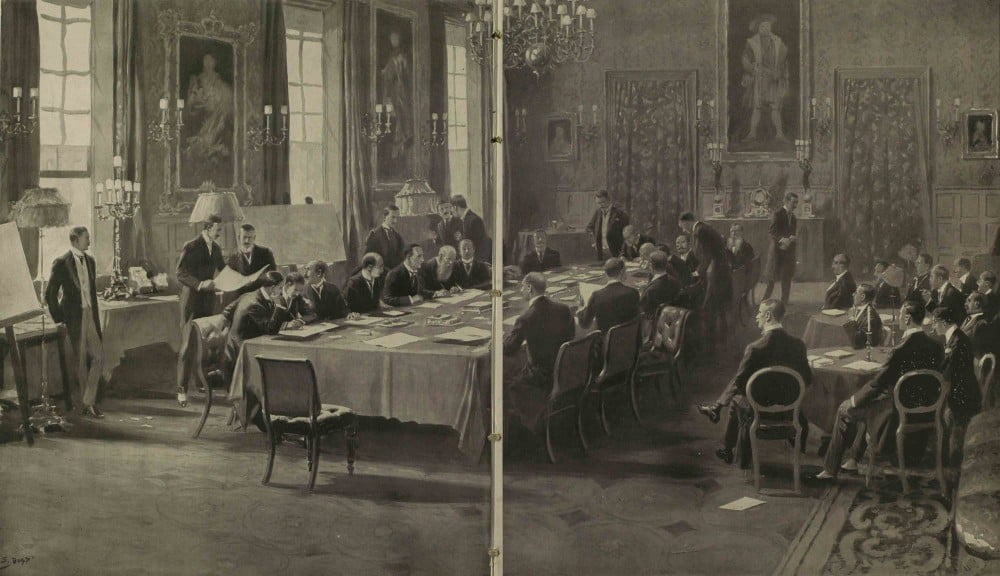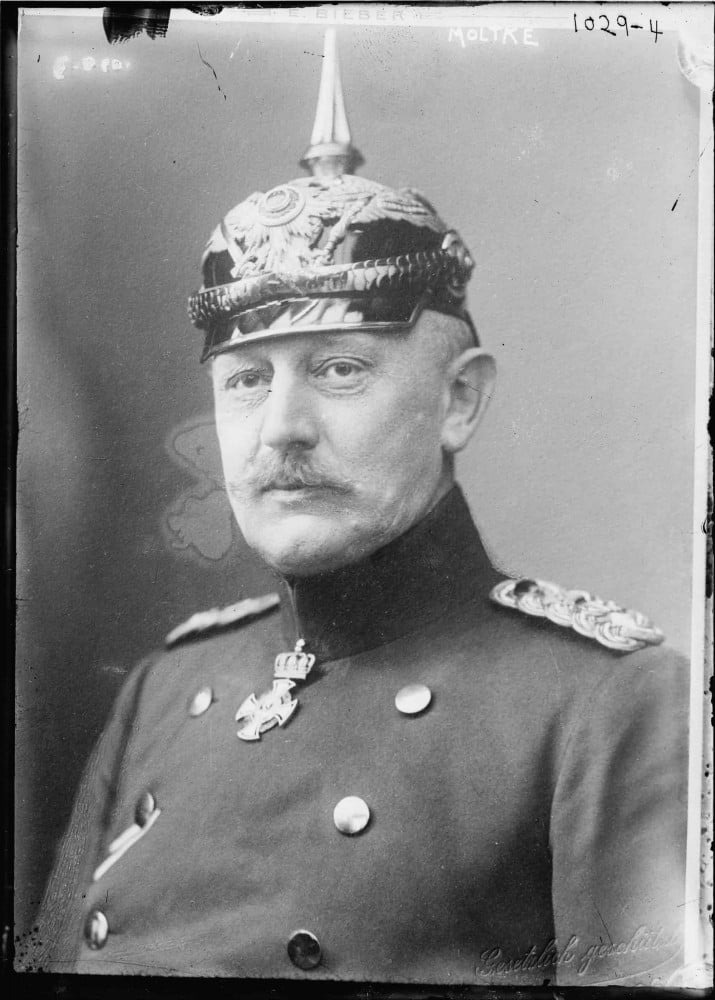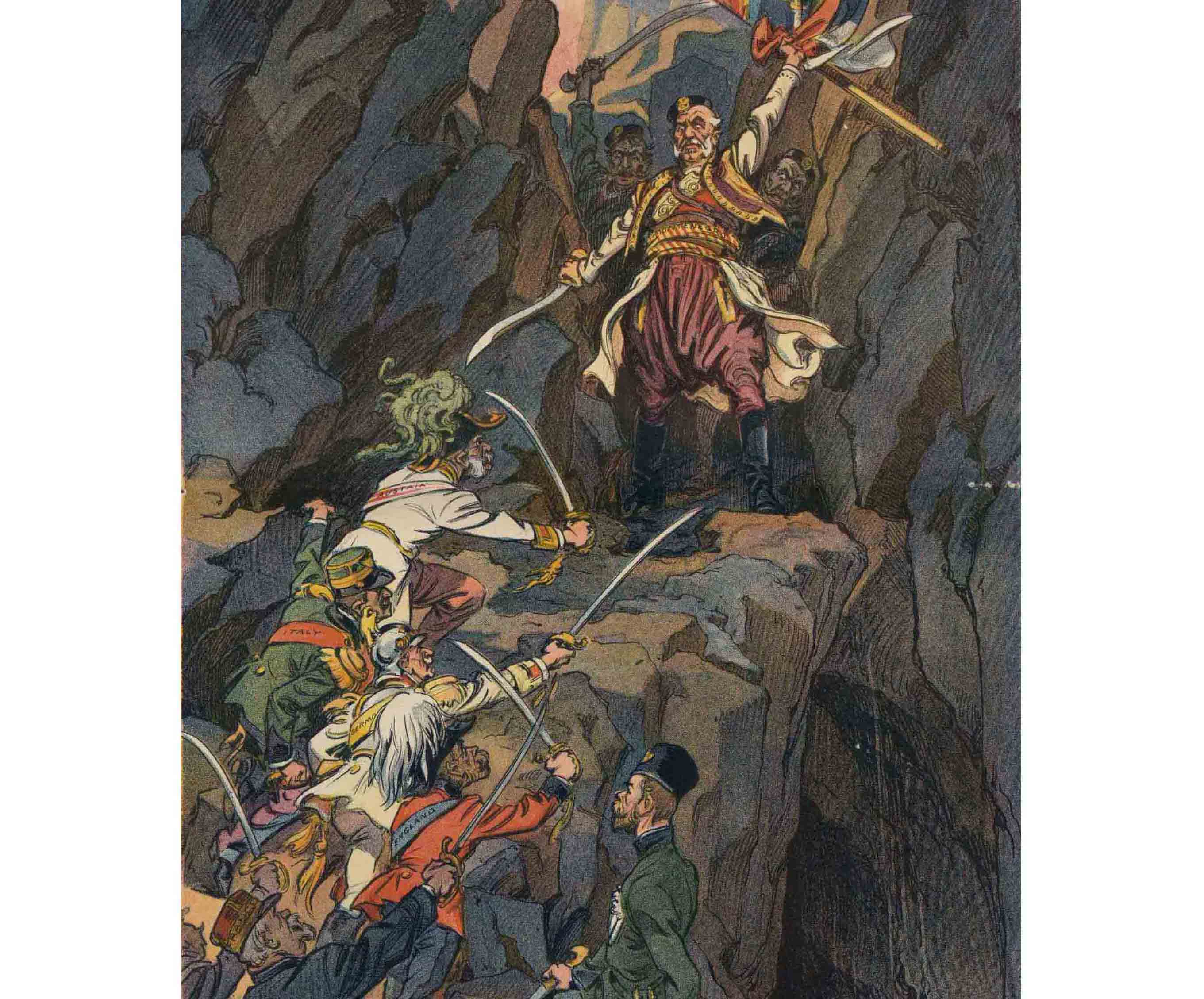The Balkans and the outbreak of war
Questions & answers with Dr. William Mulligan
What were the Balkan Wars?
The Balkan Wars were two separate wars, fought in rapid
succession, in 1912 and 1913. In the First Balkan War, Serbia,
Bulgaria, Greece, and Montenegro formed the Balkan League and
fought against the Ottoman empire. Montenegro, the smallest of
these states, declared war against the Ottoman empire on 8
October. Its allies followed suit and won a decisive, and
unexpected victory, against the Ottoman forces. By the end of the
year the Balkan states had won control of what had been the
remnants of the Ottoman empire in Europe – in Macedonia,
Thrace, and Salonika. Bulgarian forces almost reached the Ottoman
capital, Constantinople (present-day Istanbul).
What about the Treaty of London?
In December 1912 the great powers convened an ambassadors’
conference in London in a belated attempt to control the
geopolitical changes taking place in the Balkans. Throughout the
nineteenth century the Eastern question – the place of the
Ottoman empire in European politics – had been a major
preoccupation for statesmen and diplomats and a site of tension
between the great powers. Between December 1912 and May 1913 the
great powers negotiated with each other, while also attempting to
impose a settlement in the region. The treaty of London, concluded
in May 1913, appeared to bring an end to the First Balkan War.
Bulgaria expanded into Thrace, Greece took possession of the rich
port city of Salonika, and Serbia controlled Macedonia. In
addition the great powers agreed to establish an Albanian state,
though its borders were not finalised. The Ottoman empire retained
a tiny sliver of territory in Europe, as a barrier to
Constantinople.

The scene at the signing of the treaty of London in May 1913,
which ‘appeared to bring an end to the First Balkan
War’
(Image: Illustrated London News [London, England] 7 June 1913)
Why was there a Second Balkan War?
The Balkan states were dissatisfied with the outcome of the war.
In particular Bulgarian politicians complained that their army had
done the most fighting, but that Serbia had received the
lion’s share of Macedonia, in violation of a treaty between
the two states in February 1912. In June Bulgarian forces fell on
the erstwhile allies. This declaration of war proved disastrous
from the Bulgarian point of view, as it was defeated by a new
coalition of Serbia, Greece, Montenegro, the Ottoman empire, and
Romania. The Second Balkan War was ended by the treaty of
Bucharest, concluded on 10 August 1913. The Ottoman empire won
back the city of Edirne, about 40 kilometres from Constantinople,
while Romania took Dobrudja, previously part of Bulgaria.
What happened after the Second Balkan War?
Neither the treaty of London nor the treaty of Bucharest settled
territorial claims in the Balkans. Yet despite continued tensions
in the region, peace was preserved until the outbreak of the First
World War. Indeed of the belligerent states in the Balkan Wars,
only Serbia participated in the First World War from the outset.
Ultimately, though, the Balkan Wars are significant for four
reasons – the geopolitical balance, diplomatic practice, the
competing claims of empire and nation, and ethnic cleansing.
What was the significance of the Balkan Wars for geopolitics
and the alliance system?
The outcome of the Balkan Wars had a significant impact on the
great power geopolitics and the alliance system. In 1912 the great
powers formed two alliance blocs – the Triple Alliance of
Germany, Austria-Hungary, and Italy, and the Triple Entente of
Russia, France, and Britain. As military planners calculated the
distribution of their army corps and developed their war plans,
they paid close attention to changes in the balance of power. The
expansion of Serbia, which doubled in territorial and population
size, had a major impact on Austro-Hungarian security policy.
After 1913 military planners in Vienna planned to move a number of
divisions from the Russian to the Serbian front in order to
counter growing Serbian power. In turn this meant that Russian
planners could shift some troops away from the Austro-Hungarian
front to the north-eastern front against Germany. As German
military planners devoted the bulk of their forces to the
offensive against France in the west, their eastern flank now
appeared dangerously exposed. In short the shifts in the Balkans
had significant consequences for the military balance of power in
Europe, ones that were largely unfavourable for the Triple
Alliance. This increased the nervousness of figures like Helmuth
von Moltke (the German Chief of the General Staff) and his
Austrian counterpart, Franz Conrad von Hötzendorff. Moreover
it is important to remember that the Balkan wars marked the
effective end, after half a millennium, of the Ottoman empire in
Europe.

Helmuth von Moltke, the German Chief of the General Staff, was,
along with his Austrian counterpart, unsettled by the
balance-shift brought about in the Concert of Europe by the Balkan
wars.
(Image: Library of Congress Prints and Photographs Division
Washington, D.C. 20540 USA)
And the implications for diplomatic practice?
The wars also demonstrated some of the fundamental weaknesses of
the great power diplomatic system on the eve of the First World
War. For over four decades there had been peace between the great
powers – the longest period of great power peace in Europe
until the end of the Cold War. This peace resulted from many
factors, including the willingness of the powers to compromise
with each other and to manage political change in Europe, indeed
around the world. The Second Balkan War, as already mentioned, was
concluded by the treaty of Bucharest, a peace settlement brokered
by a regional power, Romania, and devoid of great power input.
This was just one of several examples of the failure of the great
powers in 1912 and 1913 to manage change. The conference of London
was a fraught affair, with Russian diplomats in particular
unwilling to force its small ally, Serbia, to comply with some of
the less appealing terms. Leopold von Berchtold, the Austrian
Foreign Minister, lost faith in the great power concert system and
began to issue ultimatums to Serbia and Montenegro from early
1913. The demands presented to Serbia following the assassination
of the Archduke Franz Ferdinand in June 1914 were, therefore, part
of a series of ultimatums. The crucial point here is that the
great powers failed to uphold the practices, norms, and
conventions that had underpinned great power peace since the
Franco-German war of 1870-1. In short these years witnessed the
erosion of great power peace as small states demonstrated that
they could, in a limited scope, determine their own political
fate.
What did it say about the rise of nationalism?
This leads into the third significant issue of the Balkan wars,
the assertion of the claims of nationalism as the focal point of
political legitimacy. Throughout Europe there was widespread
public support for the nation-building projects of the Balkan
states. This was born out of sympathy for the claims of
nationalism, viewed as a progressive political force, the basis
for democracy in a homogenous political community. The success of
the Balkan nation-states, however, had repercussions in
Europe’s other multinational empires, particularly in
Austria-Hungary and Britain. Here nationalist minorities, such as
Czechs, Croats, and Irish, sought national autonomy, rather than
independence. Nonetheless, leaders such as John Redmond, used the
Balkan Wars to underline the legitimacy of their political aims.
This was part of a wider debate that would last into the 1920s
about the nature and basis of political order in Europe in the
twentieth century and the competing claims of nation and empire.
Finally, what about ‘ethnic cleansing’ in the
Balkans?
The Balkan wars were accompanied by the first ethnic cleansing in
twentieth century Europe. The victorious Balkan armies, supported
by paramilitary units, murdered, raped, and expelled Muslims from
the lands they conquered. They destroyed mosques and forced
conversions. Territorial change was accompanied by violent
demographic and cultural change. Around 400,000 Muslim refugees
crowded into Constantinople, some of whom went on to join the
Special Organization, a major instrument in the Armenian genocide
of 1915. The nation-state, in this iteration, required violence to
purge the territory of non-nationals. Although Irish nationalists
(and unionists) shied away from the use of violence before 1914,
the Balkan wars reinforced the relationship between violence and
nation-building in the early twentieth century. In short the
Balkan Wars raised some of the fundamental issues that shaped
European politics in the decade between 1912 and 1922.
Dr William Mulligan is a lecturer in the School of History & Archives, UCD. His most recent book is The origins of the First World War (Cambridge University Press, 2010)





















